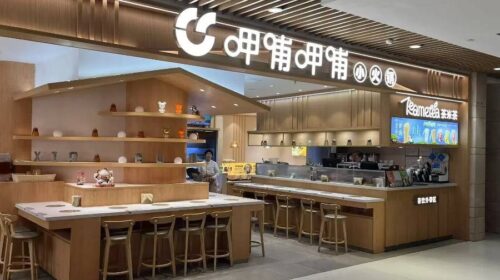Super Hi’s new chief chef brings China hotpots to the world

The global arm of hotpot giant Haidilao posted double-digit revenue growth and its second quarterly profit in the three months to September under new CEO Yang Lijuan
Key Takeaways:
- Super Hi International’s third-quarter revenue rose 14.6%, as it swung to the black during the period, reversing a year-ago loss
- The company’s shares rose 24% in Hong Kong and 21% in New York after the release of its latest results
By Edith Terry
Move over, kungpao chicken and sweet and sour pork. One of China’s first major restaurateurs seeking to bring a different Chinese dining experience to the rest of the world has heated up its stock with its latest quarterly earnings that showed nice gains on both its top and bottom lines.
There was plenty to get excited about in the latest report from Super Hi International Holding Ltd. (HDL.US, 9658.HK) issued last week. The company emerged from its history of losses to start making profits in this year’s second quarter, and it continued that tradition in the latest three-month period. Its recipe for success looks tied to the new leadership of Yang Lijuan, a former waitress who first turned around the company’s better-known China-focused parent, Haidilao International (6862.HK), and is now trying to work similar magic with its international spin-off.
The international version of Haidilao, whose name is synonymous in China with its trademark hotpot-style dining, is even finding some star power in its global foray. None other than director Woody Allen was photographed at one of its restaurants, probably in the New York borough of Queens. The chain has also attracted rave reviews on social media.
Investors like the international edition of Haidilao too. They were impressed by its third-quarter revenue that rose 14.6% year-on-year to $198.6 million, as well as its quarterly profit of $37.7 million, reversing a $1.4 million loss a year earlier. The move to the black was facilitated by an operating profit margin that rose to 7.5%, up 1.8 percentage points from a year earlier.
The company’s other metrics were tasty as well. Spending per guest rose 9% year-on-year to $25.80, and average daily revenue per restaurant was also up by about 10% – both in sharp contrast to Haidilao’s home China market where growing consumer caution is undermining business at most restaurant chains. Table turnover rate, another key indicator, increased slightly from 3.7 times per day to 3.8, while total customer count increased by 4.2% to 7.4 million.
Unlike many Chinese food and beverage chains that like to open new stores at breakneck pace, Hi International is taking a slower approach. It added just seven new stores in the third quarter of 2024, bringing its total of 121. The majority of those, 73, are in Southeast Asia, while the rest are spread out between East Asia, North America, Australia, Britain and the UAE. The company has signed contracts for another 10 new stores, with the count expected to grow by double digits this year and next, Yang said on the earnings call.
Yang became CEO in June on a transfer from parent Haidilao. Her career at the chain began when she was just 17 and worked as a junior waitress in Haidilao’s first shop. In March 2022 she became CEO when co-founder Zhang Yong stepped down.
She burnished her credentials early on when she built the restaurant chain’s business in Xi’an against the odds, and was brought in to turn the company around after an overly aggressive expansion and Covid plunged the chain deeply into the red in 2021. With Yang at the helm, Haidilao’s profit jumped 175% in 2023 to 4.5 billion yuan ($620 million) on a 34% increase in revenue to 41.5 billion yuan.
Investor thumbs-up
While the jury is still out on whether she can match her performance at Super Hi, investors gave it high marks for its third-quarter performance. Its New York-listed shares jumped 21% in the week after the earnings release, while its Hong Kong, shares were up by 24% over that period.
With a trailing price to earnings (P/E) ratio of 68, Super Hi trades much higher than some of its Chinese restaurant rivals that are also exploring foreign markets to counter anemic conditions at home. Jiumaojiu (9922.HK), operator of a popular similar hotpot-style chain, trades at a P/E of just 15, while the original Haidilao trades at 19.
Most Chinese food and beverage chains seeking to go global start with Southeast Asia, where a large ethnic Chinese population makes their food an easier sell. But progress has been slow, not only due to subtle differences in local tastes but also because supply chain efficiencies that come with large-scale operations are less practical in markets with just a few stores.
Regulation can also be an issue, as Super Hi discovered when it was unable to use one of its signature services – on-site manicures and pedicures – in the U.S. due to inability to get a necessary cosmetology license.
So, how is Yang managing the challenges? For one thing, she has brought in simple, color-coded management tools for store managers and devised smaller management units within stores, giving all managers the same performance-boosting tools. She says that use of the tools improved both customer experience and unit economics in the third quarter.
She has also introduced mechanisms to allow more customization of customer services, such as allowing for responses to their birthdays and special occasions. Another innovation has been her encouragement of successful managers to ‘adopt’ other stores where they can share their experience with other managers. The company already has centralized kitchens in Singapore and Malaysia, and is introducing small-scale processing warehouses to standardize its culinary prep as much as possible and reduce costs.
Yang is also bringing the festive atmosphere that’s a signature feature of Haidilao to the international operation, pointing out that an event with a well-known video game attracted 600,000 customers and 12,000 in co-branded orders.
Yang said she also is paying special attention to a project to incubate new brands beyond hotpot, as part of a plan to become a leading global restaurant group. “We are encouraging country managers to … explore the possibility of opening in different formats,” she said.
As she has done in previous roles with Haidilao, Yang is trying a bit of everything to see what works. Such efforts include “backfilling” by opening smaller restaurants in Singapore, opening noodle shops in North America, and offering fast food and corporate-branded meals, as well as discounts. “Obviously, competition in the F&B industry has always been very, very fierce, and price competition will always exist. So price adjustments, including discounts in off peak periods, will continue to exist for a long time,” she said.
Yang acknowledged that it’s still early days for Hi International, which will face lots of “challenges and headwinds” in its bid to create China’s first major international restaurant chain. “We still believe that there is great hope for the future, a lot of white space to be filled, and there is definitely a blue ocean opportunity out there,” she said. Given her previous track record, we would be foolish to bet against her.
To subscribe to Bamboo Works weekly free newsletter, click here






